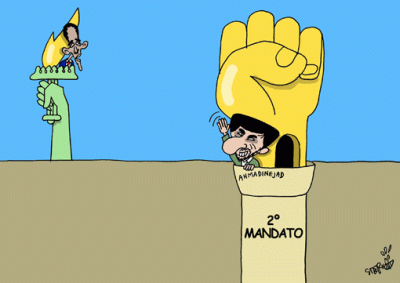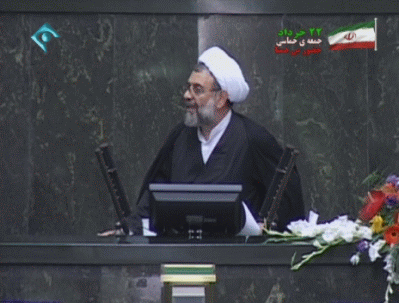
[Hoje Macau, Macau]
Die Welt, Germany
Iran and the West: On a Political Collision Course
Iranian politicians and media blame the United States
for the mass protests of recent weeks. The Iranian media doesn't give much of a
chance to dialog with Washington. All signs point toward confrontational
politics.
By Dr. Wahied Wahdat-Hagh*
††††††††††††††††††††††††††††††††††††††††††††††††††††

Translated By Ulf Behncke
August 7, 2009
Germany - Die Welt - Original Article
(German)
The cleric Hojatoleslam Hasan Taeb
[photo, right] is commander of the paramilitary Basij, which call themselves the
"Basij Resistance Force." Taeb says that in the wake of the so-called
presidential elections, the U.S. played a major role in the protests.
According to the Fars News
Agency on August 2, Taeb assumes that for the first decade of the
Islamic Revolution, the U.S. unsuccessfully pursued a "coup
strategy."
'CULTURAL
INVASION'
During the second decade,
i.e. the 1990's, U.S. foreign policy focused on a strategy of "cultural
invasion." In doing so, the Americans learned that Iran was very much different
from Iraq, emphasizes Taeb. Only during the third decade did U.S. foreign
policy concentrate on Israel's security. But even that strategy has failed,
Taeb says.
In the current fourth decade,
Taeb declares with certainty, U.S. foreign policy, "attempted to deal a
blow to the Islamic Republic with a new discourse." The U.S. had
officially entered into a dialogue with Iran. The U.S. government, however, was
apparently intent on "deliberately derailing this dialogue." In any
case, the U.S. government realized that, "Iran's national interests were
beyond reach." Meanwhile, U.S. politicians were willing, "to play
with the psyche of the Iranian people," believes Taeb.
The Basij-officer says that
the Persian-language service of the
BBC and other foreign-based Persian channels were founded in order to,
"disrupt the Iranian electoral system." Western governments allegedly
contacted presidential candidate Moussavi in order
to control the protests. What's most surprising is that Taeb declares the
millions of protesting Iranians as being seduced by the United States.
U.S.
HAS A 'STRATEGIC NEED FOR DIALOGUE'
Iranian analyst Mehdi
Mohammadi makes a different case. On July 27 he
wrote in Kayhan that the U.S. never actually had a political
strategy with regard to Iran.
After lengthy deliberations,
U.S. politicians merely came to the conclusion that, "one should talk to
Iran." The U.S. government had long since reached an agreement with Israel
on the question of dialogue with Iran. But since no dialogue had actually taken
place, no U.S. strategy was formulated. At the same time, however, Iran was to
be put under pressure economically as well as with threats of war to get it to
give in, Mohammadi writes in Kayhan.
Mohammadi claims to know the Israeli
perspective: Israel assumes that the U.S. government won't be able to prevent
the Iranian nuclear bomb, so therefore it will protect its allies with a
missile defense shield in Eastern Europe. From this, Mohammadi concludes that
the United States has a "strategic need for a dialogue with Iran."
In addition, Mohammadi is
certain that the U.S. assumes that, "the objective threats to its national
security come from Pakistan and Afghanistan," and not from Iran. For
Mohammadi, neither Israeli threats of war nor U.S. Congressional plans for
sanctions are relevant because the U.S. government is aligning itself with the
dialogue being conducted by the G8. The U.S. government's only concern
is that Iran might not take up the offer of dialogue with the United States.
And if the U.S. were to contemplate punitive measures, the goal would simply be
to draw Iran back to the negotiating table.
Iran has until September 2009
to give up its nuclear program before the G8 addresses the issue again - a
demand categorically dismissed by Iranian leaders.
Posted
by WORLDMEETS.US
DIFFERENCES
ON ISRAELI SETTLEMENTS
Iranian commentators and
politicians know full well that on the agenda during talks with Iran would be
not only the Iranian nuclear program, but also its support for Islamist
terrorism against Israel. That is why Hussam al-Din Boroumand, in
his article from August 1, also in Kayhan, refers to the differences
between the U.S. and Israel in regard to Israeli settlements. He discovered
that in regard to the impasse in the peace process, there is a substantial
discrepancy between the Islamist concept of peace and the ideas of the West.

Member
of Iranian Majlis, Ghodratollah Alikhani: 'The people's
trust
in this country's regime and leaders has been fractured.'
CHANNEL 1, Iran, June 18, CLICK HERE OR CLICK PHOTO TO WATCH 
He writes in Kayhan
that the peace process championed by the U.S. and Israel is a
"Zionist-American path to peace" and that President Obama has even
attempted to "inject" into Arab governments a "Zionist"
understanding of the peace process.
FALSE
IDENTITY OF THE ZIONIST REGIME
Kayhan, the mouthpiece of Iranian revolutionary leader Ali Khamenei, wrote that
over the past 60 years, peace has been rendered impossible due to the,
"false identity of the Zionist regime." Furthermore, the paper
suggests that, "the only way forward is to eliminate the artificial and
illegitimate Zionist regime from the geography of the region." And the
only way to "neutralize American tricks" is "confrontation."†
Posted
by WORLDMEETS.US
Actually, it isn't the
Americans or Zionists that "threaten the Islamic resistance, but
conciliatory Arabs who would give the Americans a green light to make the
"Zionist-American peace" possible. The author repeats the so-called
Islamic Republic's state ideology, which states that, "peace will only
come to the Middle East with certainty once this artificial regime has been
completely wiped off the political geography of the region."
THE
CORRECT ANSWER
There are also direct attacks
on former President Khatami
and former Prime Minister Mousavi. Ayatollah
Seyyed Ali Akbar Qureshi, member of the Assembly of Experts,
which appoints the revolutionary leader, accused
Khatami and Moussavi of having fomented the protests on behalf of Israel,
the U.S. and the U.K. He explicitly stated that "Khatami and Moussavi
wanted to block the development of the revolution and overthrow the
government."

None other than Ali Larijani, chairman of
the Iranian Majlis,
an Islamist Assembly wrongly described as a parliament, said
at the inauguration of Ahmadinejad that the Iranian people would, "in
due course give the West the appropriate answer."
*Dr. Wahied Wahdat-Hagh
was born on October 20, 1957 in Ludwigsburg, in southern Germany. He's a senior
research fellow at the European Foundation for Democracy in Brussels. He
received his PhD at the Freie Universitšt Berlin. His dissertation, 'The
Islamic Republic of Iran: The Rule of Political Islam as a Form of
Totalitarianism,' was published in 2003.
CLICK HERE FOR GERMAN VERSION
[Posted
by WORLDMEETS.US August 11, 2:45am]